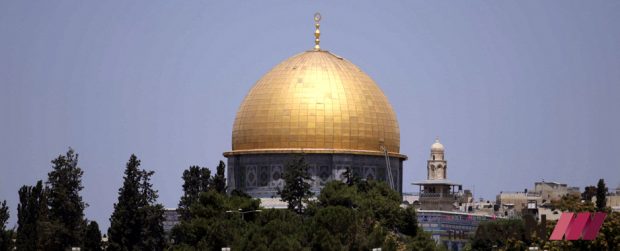The Two Middle Easts!

Dome of the Rock Mosque is seen in the Al Aqsa Mosque compound in Jerusalem’s Old City. Photo: AP
The term “Middle East” used to combine two different regions both inhabited by Arabs: Egypt and North Africa countries along with Syria, Lebanon, Palestine, Iraq and Yemen, on the one hand, and the rest of the Arabian Peninsula states: Saudi Arabia, Bahrain, Kuwait, Qatar and UAE on the other. Differentiating the two groups of countries depended on the ruling system, the first of presidential republics and the second, of monarchies with tribal ruling systems. 80 years ago, these Arab states of the gulf were weak, with no modern infrastructure, and their local rulers maintained their autonomy only with British assistance.
They continued to depend on the traditional economies of agricultural fishing, carrying goods from one country to another via the marine routes, and trading in slaves from Africa. These rulers controlled small port cities, many of which lot of deserted areas with no sight of any sort of civilization.
The discovery of oil in the region changed all this. The British found oil in Iraq after World War I. In 1932, Standard Oil Company of California (Socal) discovered oil in commercial quantities in Bahrain. Socal then obtained a concession in Saudi Arabia in 1933 and again discovered oil in commercial quantities in 1938. A chain of oil exploration activities occurred in the gulf in the 1930s with the United States and Britain competing with one another for oil concessions.
Oil exploration did not mean immediate wealth for Arab rulers of the area, as it took a long time for countries to locate amounts of considerable size. Oman, for instance, was unable to export oil until 1967. World War II delayed development of discovered fields in the 1930s; by 1950s with larger revenue come from such oil fields, the Gulf states started to export to Arabs, Asians, and European manpower to build their rich deserted communities.
In 1953, Kuwait had become the largest oil producer in the gulf. Qatar came onstream in commercial quantities in the 1950s, and Abu Dhabi began to export offshore oil in 1962. Likewise, Dubai began to profit from offshore oil deposits in the late 1960s.
This haven of work markets for Arab countries with ancient civilizations brought considerable socio-political changes throughout the region, but while the Gulf state could build their countries, the origins of the working Arab force did not. The political failures of the Arab republics, one after another, sank them into wars that were a killing any sign of progress; the 1960s Egyptian war in Yemen against the royal regime in North Yemen, Egyptian-Syrian war against the occupying state of Israel in 1967 and 1973, the Iraq war against Iran in the 1980s, the invasion of Kuwait by Iraqi troops in 1990, and so on. Still, the Gulf states were largely able to avoid much of the damage with the help of fast oil money.
Now, looking at the scene of the two different Middle Easts: the first group has all types of problems which block any effort at development, including the poor economies in Egypt and Lebanon which are due to years of instability through the wars in Syria, Iraq, and Yemen.
Most dangerously is that the radical fundamental thought raised in Saudi Arabia and countries alike, found its way to spread abroad, not only in appearing in the way tribal men and women behave and act, but with the banning of arts and violations against freedom of expression.
The two Middle Easts are mixed, so calls of splitting and dividing countries have been raised here and there, it happened in Sudan, and currently occurs in Libya, Syria, and Iraq.
Did all the oil money go into the wrong hands? I suspect this is so, because some other countries in the region were able to make much development for its future such as the UAE (although, this particular country is embroiled in the Yemen war with Saudi Arabia—against Yemeni troops with Iranian allies).
It seems we need to discover more than oil to sustain peace for the two regions; some features used to be seen and lived in those ancient civilizations countries. Where prophets of Islam, Christianity, and Jewish used to live, calling for the peace of the population, it seems their grandsons have forgot all the teachings of their holy books.


























































